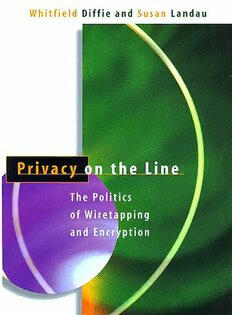
Privacy on the Line: The Politics of Wiretapping and Encryption PDF
269 Pages·1998·1.326 MB·English
Most books are stored in the elastic cloud where traffic is expensive. For this reason, we have a limit on daily download.
Preview Privacy on the Line: The Politics of Wiretapping and Encryption
Description:
This engagingly written account provides the necessary historical context and technical know-how to understand the 1990s battle over computer encryption, in which Diffie is probably the nation's best-informed expert. -- Privacy Journal Telecommunication has never been perfectly secure, as a Cold War culture of wiretaps and international spying taught us. Yet many of us still take our privacy for granted, even as we become more reliant than ever on telephones, computer networks, and electronic transactions of all kinds. So many of our relationships now use telecommunication as the primary mode of communication that the security of these transactions has become a source of wide public concern and debate. Whitfield Diffie and Susan Landau argue that if we are to retain the privacy that characterized face-to-face relationships in the past, we must build the means of protecting that privacy into our communication systems. This has not proved simple, however. The development of such protection has been delayed--and may be prevented--by powerful elements of society that intercept communications in the name of protecting public safety. Intelligence and law-enforcement agencies see the availability of strong cryptography as a threat to their functions. The U.S. government has used export control to limit the availability of cryptography within the United States, and bills introduced in Congress in 1997 would place legal restrictions on essential elements of any secure communications system. These policies attempt to limit encryption to forms that provide a "back door" for government wiretapping. Diffie and Landau strip away the hype surrounding the policy debate to examine the national security, law enforcement, commercial, and civil liberties issues. They discuss the social function of privacy, how it underlies a democratic society, and what happens when it is lost. They also explore the workings of intelligence and law enforcement organizations, how they intercept communications, and how they use what they intercept. More information is available at our book-of-the-month site.
See more
The list of books you might like
Most books are stored in the elastic cloud where traffic is expensive. For this reason, we have a limit on daily download.
